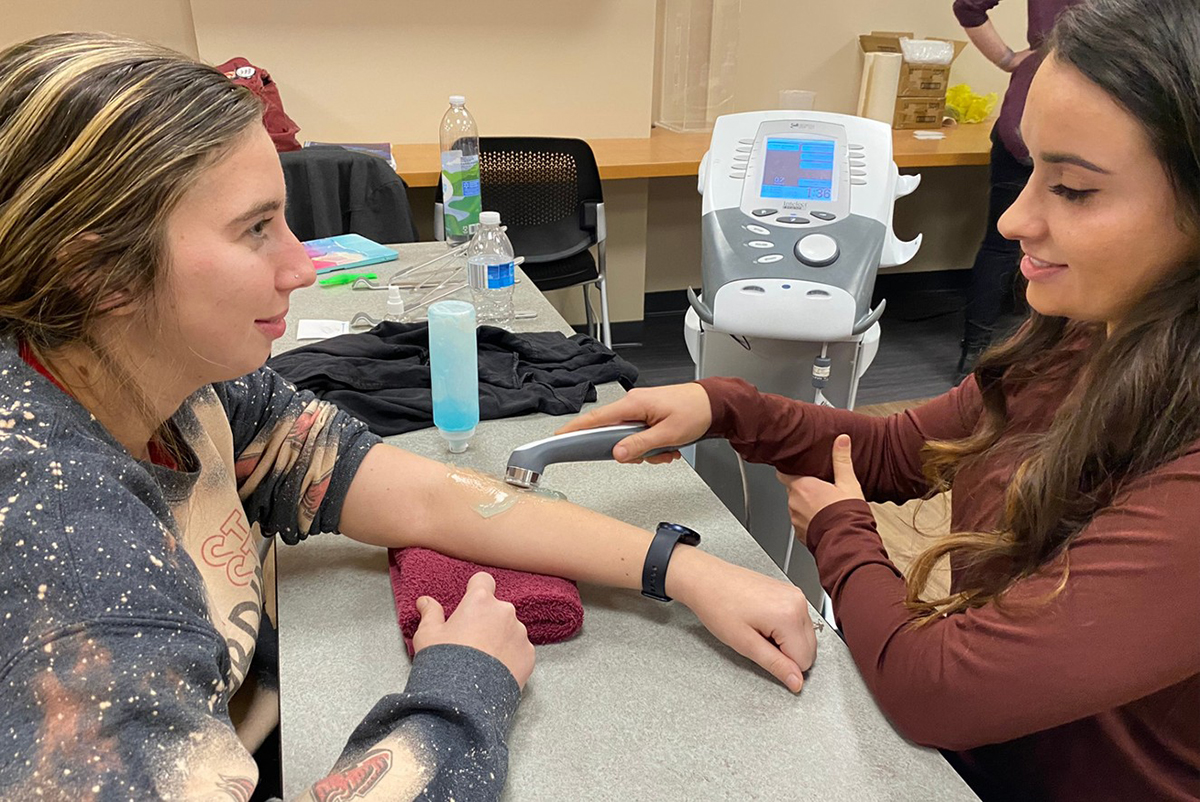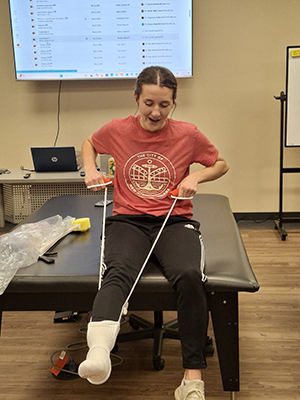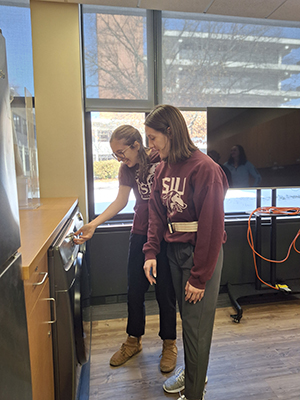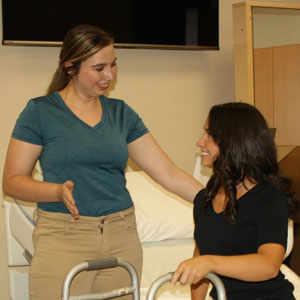
(Above NMES lab 2) Students learn to use therapeutic treatment methods, including ultrasound, to prepare clients for functional activities. (Middle, second, OT lab 44 Students practice teaching clients to utilize adaptive equipment, including this stocking aid, to increase independence with daily living activities. (Middle, third, Occupation based OT) Occupational therapists assist clients with re-training how to complete everyday tasks such as doing laundry. (Middle, fourth, Client education) Students practice providing clients with guidance in safely getting out of bed. Photos provided (Bottom, 2025-01-18) Doctoral occupational therapy program students participated in their white coat ceremony signifying the transition from classroom learning to clinical experiences. Photo by Benson Amihere
July 07, 2025
SIU welcomes occupational therapy doctoral students as new program earns accreditation
CARBONDALE, Ill. — Just three years after Southern Illinois University Carbondale introduced a program to prepare health care professionals for fulfilling careers helping clients accomplish everyday tasks and live life to its fullest, the new occupational therapy doctorate (OTD) program has received the maximum seven-year accreditation for a new program from the Accreditation for Occupational Therapy Education (ACOTE).
SIU is one of just four institutions in Illinois to hold entry-level doctoral program ACOTE accreditation and one of 135 OTD programs in the country. The full accreditation with conditions assures that graduates are qualified to take the National Board for Certification in Occupational Therapy examination and receive state licenses.
The first group of SIU students graduated in May, just after the program earned its accreditation.
“This is an exciting time for the occupational therapy program at SIU,” said Danila Cepa, occupational therapy program director and assistant professor. “Obtaining long-term accreditation for our OTD program is a major success and a huge achievement that recognizes the effort, commitment and quality of SIU’s program, faculty, administrators and students. It illustrates our commitment to meeting the needs for occupational therapists in Southern Illinois and beyond, and it sets students on the road to meaningful, satisfying careers as licensed occupational therapists.”
Something special
SIU’s entry-level doctoral program is designed to be completed in three years, with online coursework and experiential learning. Applications for this fall are still being accepted through July 15.
Students must hold a bachelor’s degree and have completed prerequisite courses to participate. They typically have an educational background in health-related fields such as exercise science, psychology or biology.
 The program includes two, full-time, 12-week fieldwork placements, completed during the summer semester of year one and spring of year two along with a 14-week, 40-hour doctoral capstone project during the final year under the mentorship of someone working in an area of expertise, such as a neonatal intensive care unit or a technology center. This hands-on learning project incorporates a written report and provides students with advanced knowledge and practical skills.
The program includes two, full-time, 12-week fieldwork placements, completed during the summer semester of year one and spring of year two along with a 14-week, 40-hour doctoral capstone project during the final year under the mentorship of someone working in an area of expertise, such as a neonatal intensive care unit or a technology center. This hands-on learning project incorporates a written report and provides students with advanced knowledge and practical skills.
Officials said having fieldwork experiences, which take place at more than 60 locations throughout the tri-state area, allows students to integrate practical learning with academic work throughout the full program.
The capstone projects focus on a diverse range of areas. The inaugural graduating class focused on perinatal care, neonatal intensive care, social justice and gender, 3D printing and virtual reality.
"The doctoral capstone experience provides the opportunity for students to gain expertise in an area of interest,” said Christine Watt, capstone coordinator and assistant professor. “It is a foundation they can build on as entrepreneurs to develop their own practice in a niche area."
Cutting-edge facilities
 SIU created a new state-of-the-art lab where students get supervised, practical experience. Located in the Applied Sciences and Arts Building, the hub includes a full working kitchen and laundry area along with other amenities where the occupational therapists in training can focus on helping patients become as independent as possible with their daily living activities. There’s also a simulated hospital room where they can hone acute care techniques and a complete custom orthotic fabrication area for practice creating adaptive tools to assist patients.
SIU created a new state-of-the-art lab where students get supervised, practical experience. Located in the Applied Sciences and Arts Building, the hub includes a full working kitchen and laundry area along with other amenities where the occupational therapists in training can focus on helping patients become as independent as possible with their daily living activities. There’s also a simulated hospital room where they can hone acute care techniques and a complete custom orthotic fabrication area for practice creating adaptive tools to assist patients.
“One thing that makes our room special is that it is equipped with cameras, which allows students to record themselves completing simulated therapy sessions so faculty and peers can assess their performance and discuss it with students,” said Kimberly Parr, academic fieldwork coordinator and associate professor of practice.
Other academic units can use the lab established through the School of Health Sciences in the College of Health and Human Sciences as well.
SIU’s program also incorporates research and innovation, leadership skills development, patient advocacy and career development. In addition, students collaborate with peers in other SIU health-related programs on simulated cases as they would in the working world.
Making a difference
A career as an occupational therapist is satisfying and gratifying in many ways, officials said.
The need for OTs is expected to grow 11% between 2023 and 2033, and the median annual salary was $98,340 in 2024, according to the U.S. Department of Labor’s Bureau of Labor Statistics.
 Occupational therapists assist people with injuries, illnesses or chronic medical conditions. Using interventions established through research and scientific evidence, they assist people in learning or relearning to get dressed, cook, eat, drive, interact with other people and much more, according to Cepa.
Occupational therapists assist people with injuries, illnesses or chronic medical conditions. Using interventions established through research and scientific evidence, they assist people in learning or relearning to get dressed, cook, eat, drive, interact with other people and much more, according to Cepa.
OTs can assist in many ways, including helping patients acquire adaptive equipment, providing techniques to assist with memory and concentration, supplying information and helping with home safety and accessibility, planning daily routines and training family members and caregivers.
Program graduates can find positions in hospitals and clinics, school systems, community centers, mental health practices, nursing homes, community agencies and other locales.
Still time to apply
The largest OTD class admitted thus far, the Class of 2026, has 12 students, but the program can accept up to 30 students, including for this fall.
Student can apply online by completing the centralized application service for occupational therapy programs and the SIU Graduate School application.
For fall 2026, students can apply between July 19 and June 20.
Learn more about the program by visiting the website, calling 618-453-7211, emailing health.sciences@siu.edu or Christine Watt at Christine.watt@siu.edu or 618-453-8836.
